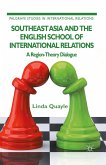Recognition in International Relations
Rethinking a Political Concept in a Global Context
Herausgegeben:Daase, C.; Geis, A.; Fehl, Caroline; Kolliarakis, Georgios
Recognition in International Relations
Rethinking a Political Concept in a Global Context
Herausgegeben:Daase, C.; Geis, A.; Fehl, Caroline; Kolliarakis, Georgios
- Gebundenes Buch
- Merkliste
- Auf die Merkliste
- Bewerten Bewerten
- Teilen
- Produkt teilen
- Produkterinnerung
- Produkterinnerung
Recognition is a basic human need, but it is not a panacea to all societal ills. This volume assembles contributions from International Relations, Political Theory and International Law in order to show that recognition is a gradual process and an ambiguous concept both in theory and political practice.
Andere Kunden interessierten sich auch für
![Recognition in International Relations Recognition in International Relations]() Recognition in International Relations39,99 €
Recognition in International Relations39,99 €![Southeast Asia and the English School of International Relations Southeast Asia and the English School of International Relations]() L. QuayleSoutheast Asia and the English School of International Relations39,99 €
L. QuayleSoutheast Asia and the English School of International Relations39,99 €![Southeast Asia and the English School of International Relations Southeast Asia and the English School of International Relations]() L. QuayleSoutheast Asia and the English School of International Relations39,99 €
L. QuayleSoutheast Asia and the English School of International Relations39,99 €![Émigré Scholars and the Genesis of International Relations Émigré Scholars and the Genesis of International Relations]() F. RoeschÉmigré Scholars and the Genesis of International Relations39,99 €
F. RoeschÉmigré Scholars and the Genesis of International Relations39,99 €![Émigré Scholars and the Genesis of International Relations Émigré Scholars and the Genesis of International Relations]() F. RoeschÉmigré Scholars and the Genesis of International Relations39,99 €
F. RoeschÉmigré Scholars and the Genesis of International Relations39,99 €![Asian Thought on China's Changing International Relations Asian Thought on China's Changing International Relations]() Emilian KavalskiAsian Thought on China's Changing International Relations39,99 €
Emilian KavalskiAsian Thought on China's Changing International Relations39,99 €![Asian Thought on China's Changing International Relations Asian Thought on China's Changing International Relations]() Emilian KavalskiAsian Thought on China's Changing International Relations39,99 €
Emilian KavalskiAsian Thought on China's Changing International Relations39,99 €-
-
-
Recognition is a basic human need, but it is not a panacea to all societal ills. This volume assembles contributions from International Relations, Political Theory and International Law in order to show that recognition is a gradual process and an ambiguous concept both in theory and political practice.
Produktdetails
- Produktdetails
- Palgrave Studies in International Relations
- Verlag: Palgrave Macmillan / Palgrave Macmillan UK / Springer Palgrave Macmillan
- Artikelnr. des Verlages: 978-1-137-46471-2
- 2015 edition
- Seitenzahl: 284
- Erscheinungstermin: 8. Mai 2015
- Englisch
- Abmessung: 223mm x 139mm x 22mm
- Gewicht: 500g
- ISBN-13: 9781137464712
- ISBN-10: 1137464712
- Artikelnr.: 41786658
- Herstellerkennzeichnung
- Libri GmbH
- Europaallee 1
- 36244 Bad Hersfeld
- gpsr@libri.de
- Palgrave Studies in International Relations
- Verlag: Palgrave Macmillan / Palgrave Macmillan UK / Springer Palgrave Macmillan
- Artikelnr. des Verlages: 978-1-137-46471-2
- 2015 edition
- Seitenzahl: 284
- Erscheinungstermin: 8. Mai 2015
- Englisch
- Abmessung: 223mm x 139mm x 22mm
- Gewicht: 500g
- ISBN-13: 9781137464712
- ISBN-10: 1137464712
- Artikelnr.: 41786658
- Herstellerkennzeichnung
- Libri GmbH
- Europaallee 1
- 36244 Bad Hersfeld
- gpsr@libri.de
Alyson J. K. Bailes, University of Iceland, Iceland Janusz Biene, Goethe University Frankfurt, Germany Sven-Eric Fikenscher, John F. Kennedy School of Government, United States Carolin Goerzig, Virginia Commonwealth University, United States Volker M. Heins, Institute for Advanced Study in the Humanities (KWI), Germany Claudia Hofmann, American University in Washington D.C., United States Mattias Iser, Binghamton University, United States Lena Jaschob, Goethe University Frankfurt, Germany Michelle Murray, Bard College, United States Stefan Oeter, University of Hamburg Law School, Germany Nicholas Onuf, Florida International University, United States Rebecca Richards, Lancaster University, United Kingdom Erik Ringmar, Lund University, Sweden Brad R. Roth, Wayne State University, United States Robert Smith, Coventry University, United Kingdom Reinhard Wolf, Goethe University Frankfurt, Germany.
PART I: CONCEPTUAL FOUNDATIONS 1. Gradual Processes, Ambiguous Consequences: Rethinking Recognition in International Relations; Anna Geis, Caroline Fehl, Christopher Daase and Georgios Kolliarakis 2. Recognition between States? Moving beyond Identity Politics; Mattias Iser PART II: RECOGNITION AMONG STATES 3. China's Place in Four Recognition Regimes, Erik Ringmar 4. Constructing the July Crisis: The Practice of Recognition and the Making of the First World War ; Michelle Murray 5. Seeking Status Recognition Through Military Symbols: German and Indian Armament Policies Between Strategic Rationalizations and Prestige Moves; Sven-Eric Fikenscher, Lena Jaschob and Reinhard Wolf ? 6. Understanding the Puzzle of Unequal Recognition: The Case of the Nuclear Non-Proliferation Treaty; Caroline Fehl PART III: RECOGNITION OF STATES AND GOVERNMENTS 7. (Non)Recognition Policies in Secession Conflicts and the Shadow of the Right of Self-Determination; Stefan Oeter 8. Reconceptualizing Recognition of States and Governments; Brad R. Roth 9. Statebuilding and the Politics of Non-Recognition; Rebecca Richards and Robert Smith 10. Recognition as a Second Order Problem in the Resolution of Self-Determination Conflicts; Georgios Kolliarakis PART IV: RECOGNITION AMONG STATES AND NON-STATE ACTORS 11. Recognition Going Awry: NGOs and the Global Rise of the Unelected; Volker M. Heins 12. Gradual Recognition: Curbing Non-State Violence in Asymmetric Conflict ; Janusz Biene and Christopher Daase 13. The Dark Side of Recognition: Mutual Exclusiveness of Passive and Active Recognition in the Middle East Conflict; Claudia Hofmann and Carolin Goerzig PART V: CONCLUDING REFLECTIONS 14. Legal Precision or Fuzzy Feelings? A Diplomatic Comment on Recognition Studies; Alyson J. K. Bailes 15. Acts of Recognition, Shades of Respect; Nicholas Onuf
PART I: CONCEPTUAL FOUNDATIONS 1. Gradual Processes, Ambiguous Consequences: Rethinking Recognition in International Relations; Anna Geis, Caroline Fehl, Christopher Daase and Georgios Kolliarakis 2. Recognition between States? Moving beyond Identity Politics; Mattias Iser PART II: RECOGNITION AMONG STATES 3. China's Place in Four Recognition Regimes, Erik Ringmar 4. Constructing the July Crisis: The Practice of Recognition and the Making of the First World War ; Michelle Murray 5. Seeking Status Recognition Through Military Symbols: German and Indian Armament Policies Between Strategic Rationalizations and Prestige Moves; Sven-Eric Fikenscher, Lena Jaschob and Reinhard Wolf ? 6. Understanding the Puzzle of Unequal Recognition: The Case of the Nuclear Non-Proliferation Treaty; Caroline Fehl PART III: RECOGNITION OF STATES AND GOVERNMENTS 7. (Non)Recognition Policies in Secession Conflicts and the Shadow of the Right of Self-Determination; Stefan Oeter 8. Reconceptualizing Recognition of States and Governments; Brad R. Roth 9. Statebuilding and the Politics of Non-Recognition; Rebecca Richards and Robert Smith 10. Recognition as a Second Order Problem in the Resolution of Self-Determination Conflicts; Georgios Kolliarakis PART IV: RECOGNITION AMONG STATES AND NON-STATE ACTORS 11. Recognition Going Awry: NGOs and the Global Rise of the Unelected; Volker M. Heins 12. Gradual Recognition: Curbing Non-State Violence in Asymmetric Conflict ; Janusz Biene and Christopher Daase 13. The Dark Side of Recognition: Mutual Exclusiveness of Passive and Active Recognition in the Middle East Conflict; Claudia Hofmann and Carolin Goerzig PART V: CONCLUDING REFLECTIONS 14. Legal Precision or Fuzzy Feelings? A Diplomatic Comment on Recognition Studies; Alyson J. K. Bailes 15. Acts of Recognition, Shades of Respect; Nicholas Onuf








